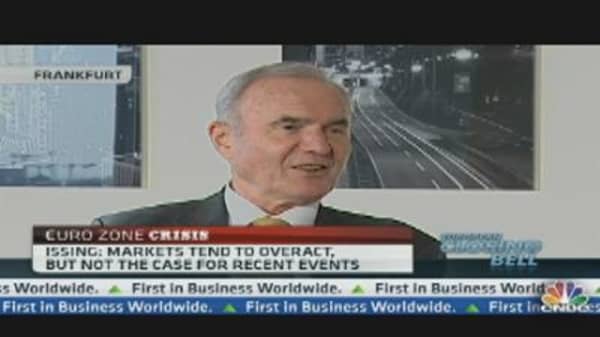The worst of the euro zone crisis is over as leaders in the European Union have taken a lot of steps to fix the underlying issues, Otmar Issing, a German economist and former European Central Bank chief economist, told CNBC late on Tuesday.
Stocks closed the session higher and the euro rose for the first time in three sessions on Tuesday on optimism sparked by better-than-expected Chinese gross domestic product data and by a successful Spanish T-bill auction.
German investor sentiment, as measured by the ZEW survey, jumped the most in the index's history.
"I think the peak of the crisis should be behind us because since all the problems became public, a lot has changed, a lot has been done," Issing said.
Analysts told CNBC.com that the markets' optimism was likely to be short-lived as Greece will most likely default and the euro zone must still find solutions to difficult problems.
Issing said that in Italy the new government "has totally changed course" and that reforms that the world had been waiting for "for years" had been implemented "in a few weeks."
The S&P downgrade of nine euro zone members, which knocked down the euro and spooked stock markets last Friday "came at a moment when I think things are improving," Issing said.
Investors are nervously watching talks between Greece and private sector investors on a debt swap to see if the country can persuade investors to shoulder the burden of its debt restructuring. The talks are due to resume on Wednesday.
Issing said Greece has been isolated from the other euro zone members and the risk of the debt problem spreading has diminished.
"I think Greece is a different case, different from other countries. The risk of contagion has declined a lot. If Greece would have defaulted a year ago, Ireland would have had a high risk of contagion, Italy, etc," he said.



